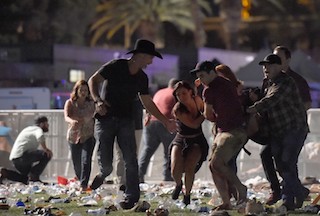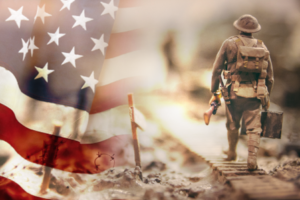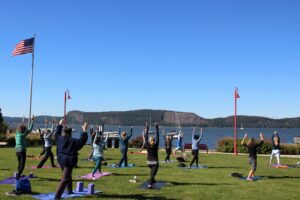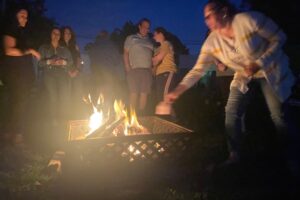 In planning for this issue, Publisher Robert Bonvento and I decided to get into the spirit of the season and write about what people like about being scared on purpose, such as we do on Halloween, on roller coasters, in fun houses, etc. I was going to write about the psychological reasons for controlled fright and the fun that people have in our community at this time of year, participating in the Haunted Hayride, hearing scary stories, and seeing the Headless Horseman come galloping across the field at a homecoming game. But then I went away for the weekend and procrastinated on my article. It was due on Monday, and I knew I had a light patient schedule and could write it during the day and get it in on time. But today we woke up to what is being called the worst mass murder in United States history. As of this writing, approximately 12 hours after a shooting at a Las Vegas music festival, the death toll is over 50 and those injured are reported to be in the hundreds (the New York Times is reporting over 500; CNN is reporting 515, with 58 dead; the number of dead is likely to climb, as some are injured very seriously and critically.)
In planning for this issue, Publisher Robert Bonvento and I decided to get into the spirit of the season and write about what people like about being scared on purpose, such as we do on Halloween, on roller coasters, in fun houses, etc. I was going to write about the psychological reasons for controlled fright and the fun that people have in our community at this time of year, participating in the Haunted Hayride, hearing scary stories, and seeing the Headless Horseman come galloping across the field at a homecoming game. But then I went away for the weekend and procrastinated on my article. It was due on Monday, and I knew I had a light patient schedule and could write it during the day and get it in on time. But today we woke up to what is being called the worst mass murder in United States history. As of this writing, approximately 12 hours after a shooting at a Las Vegas music festival, the death toll is over 50 and those injured are reported to be in the hundreds (the New York Times is reporting over 500; CNN is reporting 515, with 58 dead; the number of dead is likely to climb, as some are injured very seriously and critically.)
The shooters’ brother described the events of last night as if “an asteroid fell from the sky.” He reports that his brother did not have machine guns when he helped him move into his current place of residence, and his shock and confusion over what his family member was capable of is palpable when watching the short video of his statement to the press. One report is stating that their father was a bank robber who was on the FBI’s most wanted list. But we should not pay for the sins of our fathers, nor presume that we fall so close to the tree that biology is destiny. The shooter, Stephen Paddock, was not known to police for anything more than a traffic violation, and by all accounts he was enjoying his retirement playing high stakes poker games. His brother reports that he knew of no political or religious allegiances that would have led to such violent and bizarre behavior. As in many of these cases, neighbors report that they didn’t know Mr. Paddock well and found him to be “standoffish,” although his girlfriend was friendlier and better known to their neighbors. He was a licensed pilot and owned two planes. He had a hunting license in another state. Aside from being aloof, which is not a crime, there was nothing unusual about the shooter, who died by apparent suicide after his rampage.
So now instead of writing about controlled fear, the thrill of being scared when a plastic skeleton falls out of a tree in the dark, or a carnival ride goes up so high that you feel a bit of vertigo, I am writing about real fear, real justified fear, fear because no place seems safe anymore. School children have been murdered in their classrooms. People have been killed in movie theaters over small “snits” that should be over in 30 seconds. Cars have been driven into crowds. Bullets have been strewn into nightclubs and parking lots. And lest we forget, 16 years ago, 3000 civilians died at work – not police officers or firemen or soldiers or others who risk their lives day to day, but investment bankers, waiters, secretaries, people just going to work, when terrorists flew planes into their office buildings, ending the false sense of security we had in America. After all, no foreign attack had happened on our soil since 1941, we had a good run, and we felt lucky to be safer than places like London or Tel Aviv where terrorist attacks were more common. Well, we felt lucky when we thought about it at all.
How do we deal with the fear that naturally comes from incidents like this? How do we go on with our lives when we hear time and time again that innocent people enjoying themselves, going to work, children going to school, are killed because some random guy flipped a switch and something happened? And the flip side – how do we not grow complacent because this has become so common that we can’t even take in all the shock, fear, and anger it causes? How do we explain to children that we try to keep them safe, and how to keep themselves safe, in a world with such random acts of violence? Growing up I lived on the third floor of a six-story building with 12 apartments on each floor. Our apartment was in the front, so our fire escape was visible to those walking on the street or looking out the windows of neighboring buildings. I lived through the blackout of 1977 and the Son of Sam murders that same summer. Independent of that, as happens in any large city, on occasion there would be break-ins and robberies and gossip would travel or a sign would be hung in the elevator to be careful and report suspicious behavior. Eight-year-old me was terrified of the possibility of coming home to a burglar, which I assuaged by grabbing my child-sized baseball bat and checking under beds and in closets when I returned home with my family. My parents indulged me these Wonder Woman aspirations, but in all seriousness, when I expressed such fears my mother could soothe them with certain realities. Our fire escape and other windows were in the front, easily visible. The fire escape window was always locked. Our apartment sat in the corner of the hallway, making a perpetrator get stuck if he were caught trying to break in through our apartment door – an apartment in the middle of the hall was more vulnerable, according to my mother. We never let people in without ascertaining who was at the door. We had a doorman, at least some of the time, watching over things. Two janitors and what used to be called a “porter” roamed the halls making repairs, doing maintenance, carrying packages, and would deter most people looking to commit a crime in our building. Most of all, the neighborhood was a safe one, bordered on one side by the Narrows, and on the other by an equally safe neighborhood, and crimes beyond car theft and petty break-ins were rare. Occasional muggings occurred, but I was a child and not likely to be walking alone in the dark with an expensive watch or full wallet, so I didn’t worry about getting mugged for my ice cream money or whiffle ball. In addition, I was taught to sit near the conductor on the subway (where are they now?) because he kept an eye on those middle cars. There were measures to take to minimize risk that seem quaint now.
But what do we tell children now? Saying that your apartment windows face other apartment windows is not enough. Believing you won’t get hurt because your area is safe negates what has happened repeatedly – safe places like elementary schools, college campuses, movie theaters, supermarkets, nightclubs and concerts have been targets of aggressive and violent acts where many people have died or been injured. A current movie highlights the injuries and recovery of a victim of the Boston Marathon bombing. Every September 11th we mourn the dead in our area who perished when the towers came down. Never mind what to tell the children? What do we tell ourselves? I was on a plane as the events of last night were unfolding – do I really believe that I’m safe on an airplane because the TSA won’t let people bring a bottle of water aboard, or is it something I just tell myself because in reality if someone wants to commit such atrocities he will find a way?
This morning the American Psychological Association put out a publication on how to deal with the emotional aftermath of mass shootings such as what happened in Las Vegas. It can be found here: http://www.apa.org/helpcenter/mass-shooting.aspx. Here are the main takeaways when dealing with such horrific events:
*Talk about it and ask for support if you need it.
*Strive for balance, take a healthy perspective, don’t get caught up in the fear and negativity.
*Turn it off and take a break, don’t watch the 24-hour newsreels unless there are new developments to be reported. The images, especially today when everyone has a cell phone with a decent camera and news is posted on social media immediately, can be very disturbing and graphic. Shut it off if you can’t handle it. I lost a close friend in Tower One, my cousin is a survivor of the Customs Building, and my friend’s cousin was the last patient released from the burn center and one of the few who survived above the point of impact. I have yet to watch footage of September 11th and I probably never will. Know what you can handle and set that limit.
*Honor your feelings. You will have a range of emotions. Anger, fear, confusion, etc. You may even feel sorry for the perpetrator, or at least for the perpetrator’s family. Clearly something is wrong when a person opens fire on innocent victims, and the conflict you may feel if you have empathy for a murderer is OK. You may feel rage that is foreign to you. Feel what you have to feel.
*Take care of yourself. Engage in healthy behaviors, rest, exercise, eat normally, don’t let the anxiety of an event like this throw you off your healthy routines.
*Help others or do something productive. Sometimes there are fundraisers for victims or other ways to get involved. That may help you feel less powerless.
*If you are someone who lost a loved one in such a tragedy, remember that grieving is a process and it often takes a very long time. You usually have to get past certain important dates such as the victim’s birthday, an anniversary, and the anniversary of the loss. Holidays can also be very difficult, especially in the first year or two after the loss, as the person’s absence can be felt more severely then. Acknowledge the loss on those days and eat your loved one’s favorite food, watch a favorite show, or do something you used to do together.
*Get professional help if need be, for you or your children. None of us can live without any fear or anxiety, and in today’s world, it’s getting harder to go through life with a clear head. But the reality is that while these random acts of violence seem to be getting more common, they still personally touch just a small percentage of the population. We are much more likely to leave at the end of a concert or movie and go about our day safely than we are to be the victim of a mass shooter. While any incident is one too many, and when the victims are children it seems that much more egregious, the numbers indicate that we are safer than we may think, and we need to keep that in mind. Yes, the world seems to be changing for the worse, and it’s hard to have as much hope as we need, but it’s not impossible.
Barbara Kapetanakes, Psy.D. practices psychotherapy in Sleepy Hollow.






